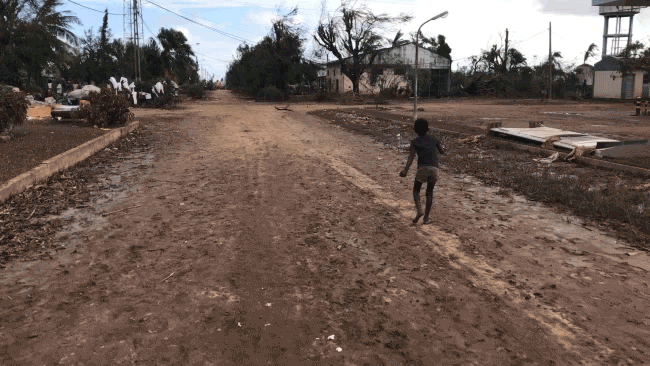We didn’t know his name or even see his face. But amid the grim scene of a cyclone-devastated village, the little boy stood out because he danced.

He skipped down the muddy street in Buzi to music only he could hear, oblivious to the suffering around him, at least for a while. He was barefoot and in muddy shorts. He likely wore the only clothing he had left.

Like many children in the wake of Cyclone Idai in Mozambique, he was alone. But he seemed to have a destination, and that put him well ahead of most.
He was almost certainly headed to a makeshift shelter or the concrete floor of a school, now crammed with wet laundry, cooking fires and displaced people.
READ MORE: Nearly 2 million people affected by Cyclone Idai’s devastation in Mozambique, UN says
Life there was perilous. At one school, another small boy lay curled up in a doorway, dozing next to a pile of still-warm ashes.
Hundreds of thousands of uprooted lives, many of them children, have been scattered by the storm that roared in on March 14. Homes were washed away by rivers that burst their banks, sending waters rushing over a vast stretch of central Mozambique, as high as the tops of trees.
- Olympic medallist wins bronze, confesses on live tv to cheating on girlfriend
- Parents condemn $176 fines for hostel staff after daughters died from tainted alcohol
- U.S. sinks to its lowest spot in new global corruption ranking
- Canadians wait for flights out of Cuba, aid struggling to get in amid U.S. energy blockade
Survivors described opening the doors of their homes to water that reached their necks. They raced to gather their families and scramble onto rooftops.

Get daily National news
There they stayed, sometimes for days. They drank the water around them, as filthy as it was, to stay alive.
WATCH: Mozambique begins recovery operations after deadly Cyclone Idai

On one rooftop a woman gave birth. The baby lived.
Finally, in some cases, a helicopter appeared. It dropped biscuits to eat. And it posed an immediate and painful decision: Whom to save first?
Some families were ripped apart as women or children, or the injured, were whisked away.
What remains, more than two weeks after the cyclone made landfall, is a sodden landscape of disconnectedness and grief.
READ MORE: Estimated 900,000 children orphaned, separated or impacted in Mozambique
Phones barely ring or ping, if at all. Internet service was severed and is only now inching back with the aid of emergency responders.
In flashes of hope, people have scouted out the highest points on the flat landscape, waving cellphones in the air: A three-story building in Buzi. A highway overpass in the city of Beira, home to 500,000 and now 90 percent destroyed.
Those who couldn’t find a signal were despondent over the chances of finding missing loved ones.
Officials who are pressed for estimates of the number of missing people don’t even try. Even the death toll, now above 700 in Mozambique, Zimbabwe and Malawi, is called very preliminary. It may never be known.
WATCH: 1000 feared dead after Cyclone Idai hits Mozambique

The numbers offered by humanitarian agencies have become a blur. Some 1.8 million people in urgent need. Nearly 136,000 people displaced in worst-hit Mozambique alone. More than 50,000 homes there destroyed.
In the port city of Beira, fishing boats pulled up one by one on the beach carrying survivors ashore from Buzi and other places.
Children huddled, damp and bewildered, until aid workers drove them away in the back of a pickup truck. They were destined for one of many impromptu displacement camps, likely a school.
Conditions in the camps are often squalid, with little clean water, sanitation or medical supplies. A cholera outbreak has begun, and is gaining speed.
READ MORE: Canada will give $3.5 million to aid African nations reeling from Cyclone Idai
Amid the chaos, families still search for children, parents, spouses, often in vain.
Some survivors stood on the beach in Beira and watched the fishing boats arrive, looking for a familiar face in the crowd.
Zacarias Mauta stood alone. He had come from Buzi, where he survived by climbing a tree. Four days later a helicopter plucked him up and brought him to Beira, a city he had never seen.
He wants to reunite with his family, including four children under the age of 6. He hopes they were taken to Beira as well but does not know.
“I wanted to hold my family but I couldn’t,” he said of their separation in the storm. “I was also in jeopardy.”
Maybe he will find an acquaintance who knows their fate. Maybe he will find work in the unfamiliar city so he can keep looking for them. Maybe the government will help him.
The cyclone taught him this, he said: “It’s not safe anywhere anymore.”







Comments
Want to discuss? Please read our Commenting Policy first.